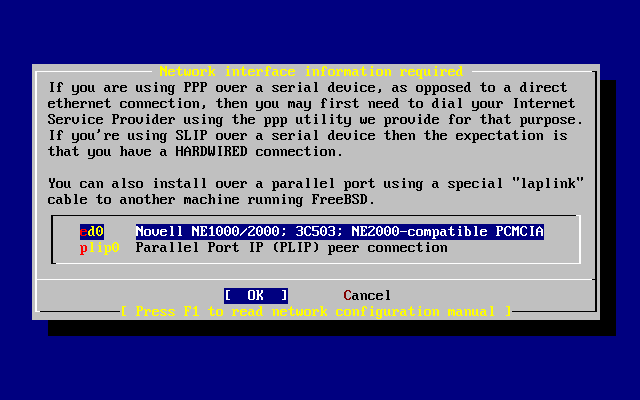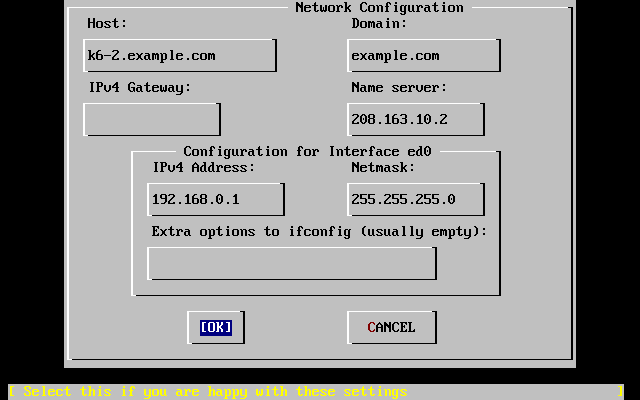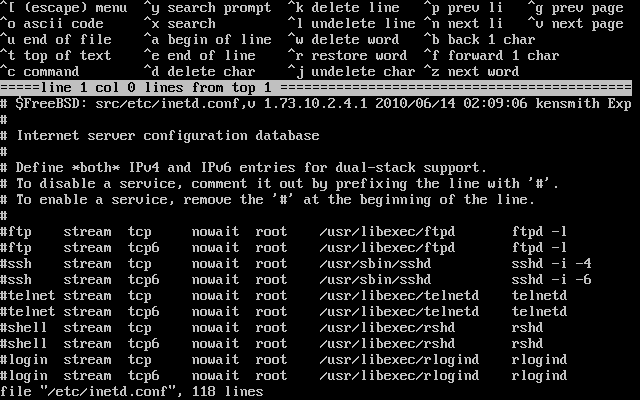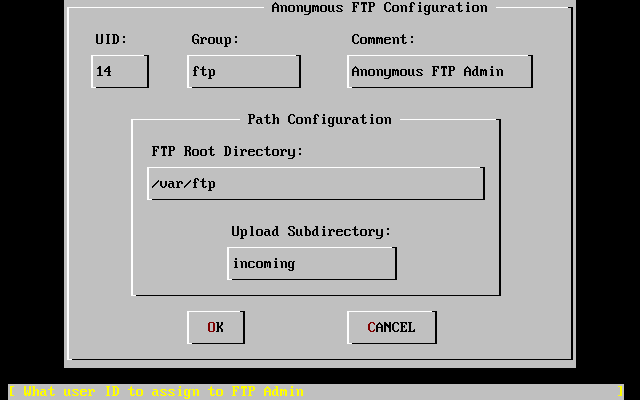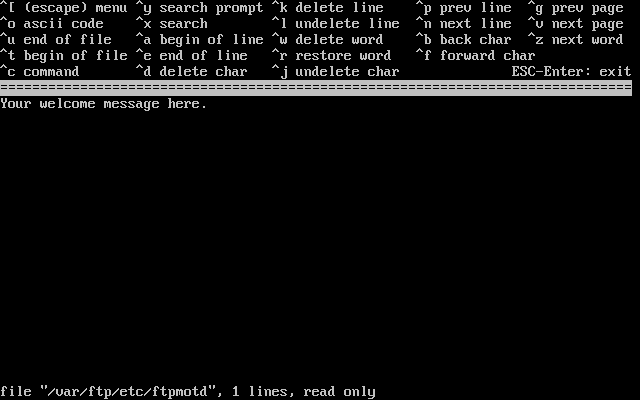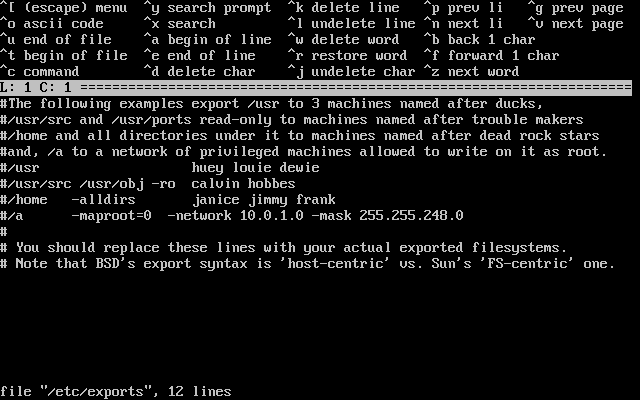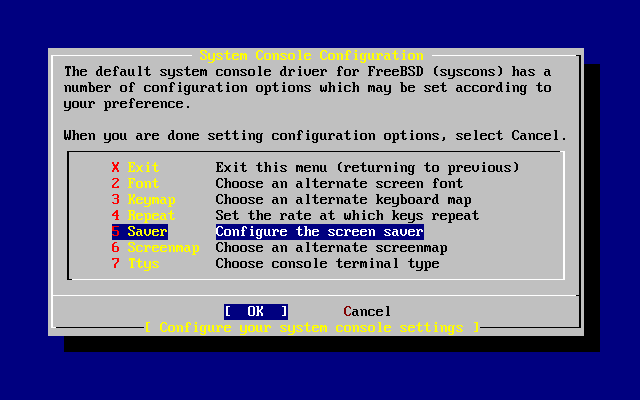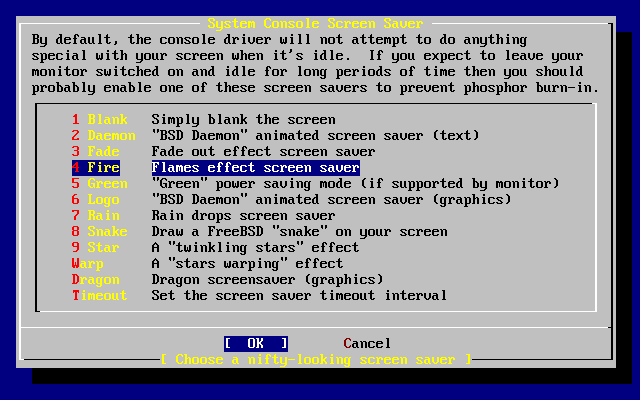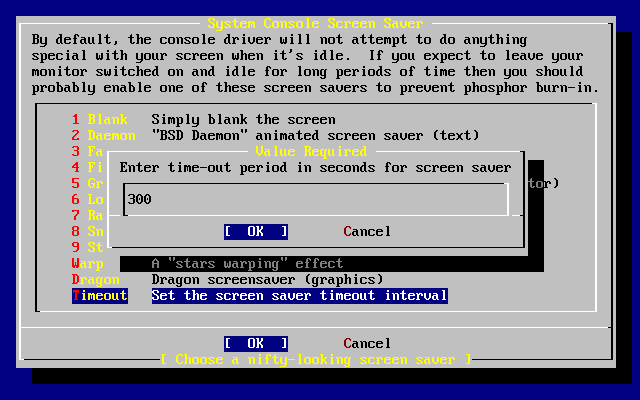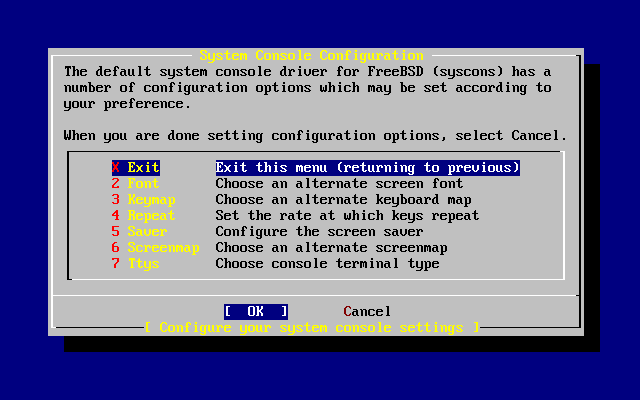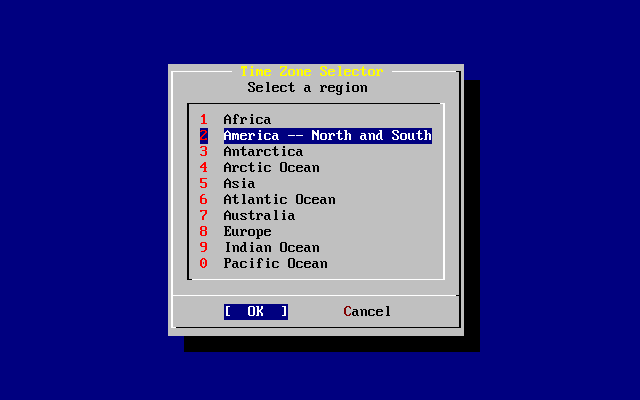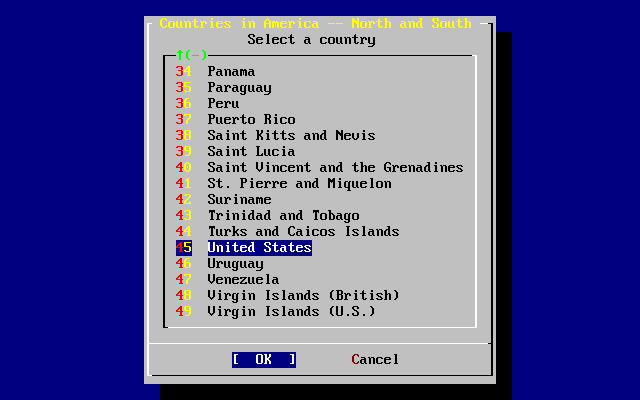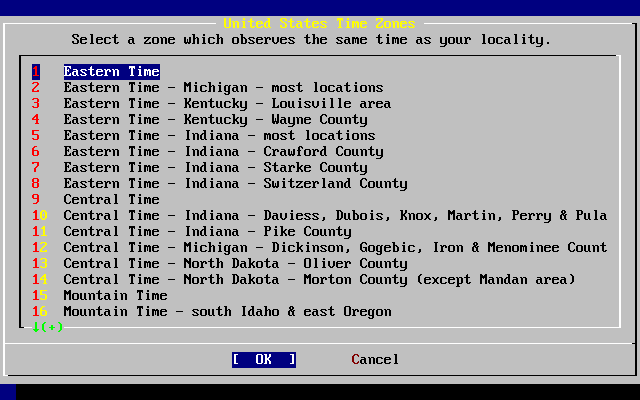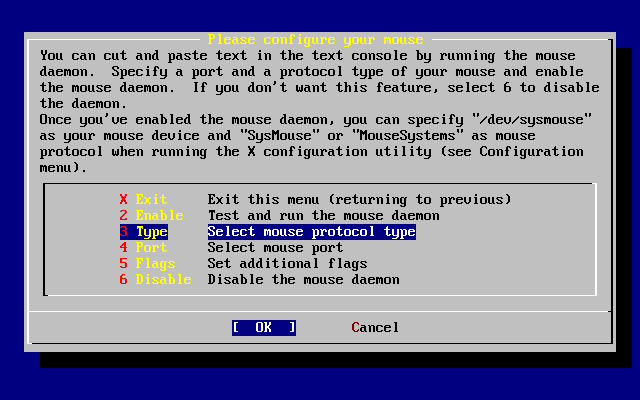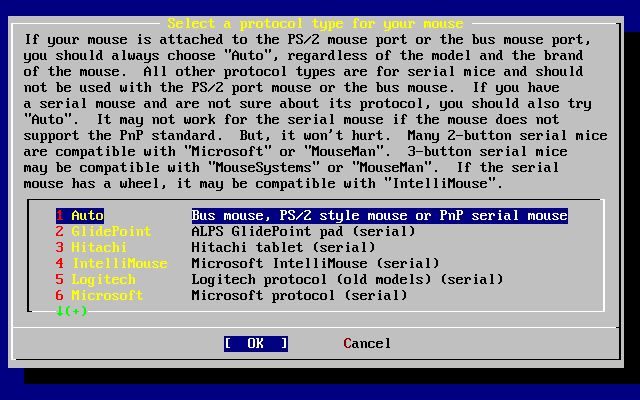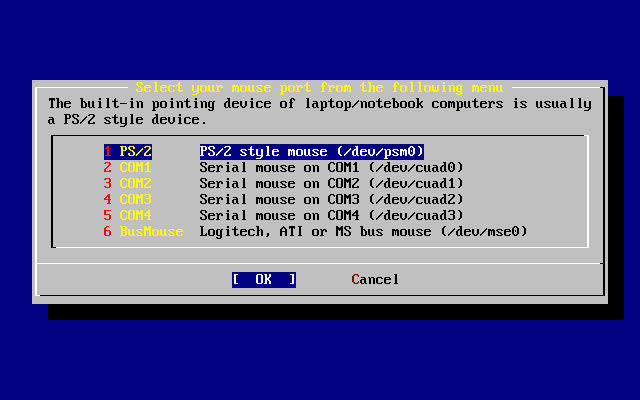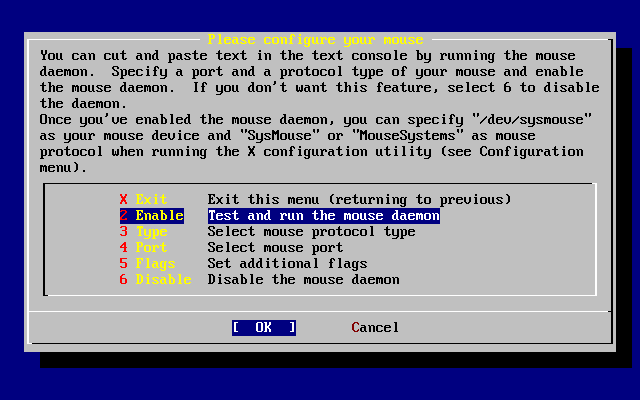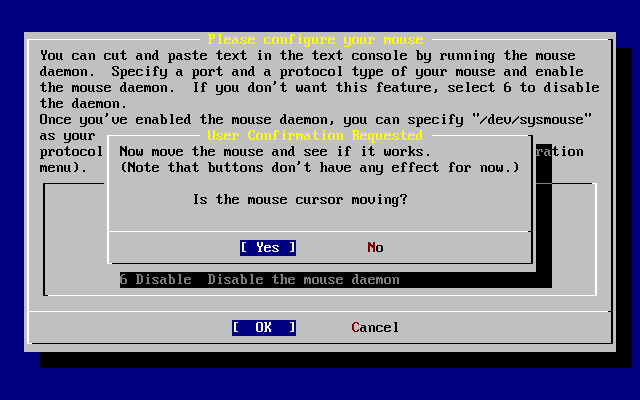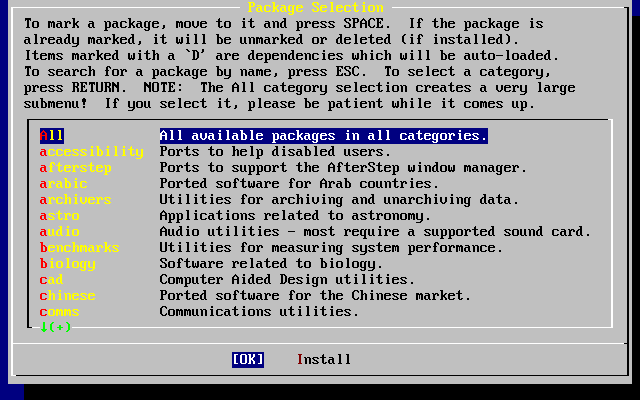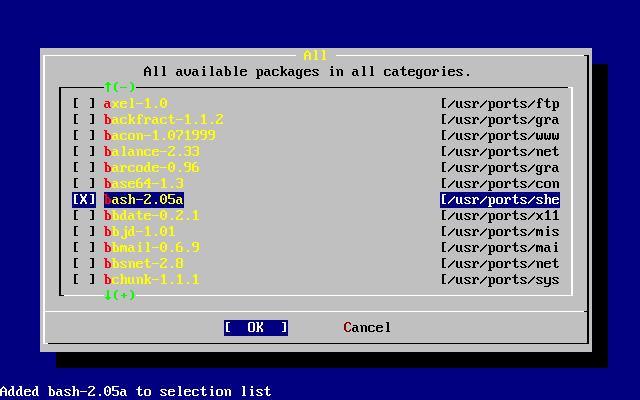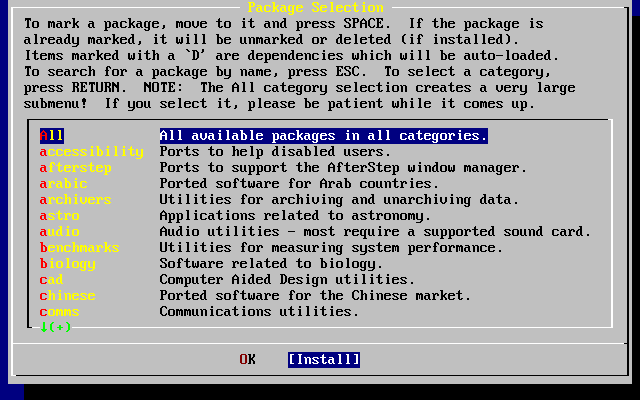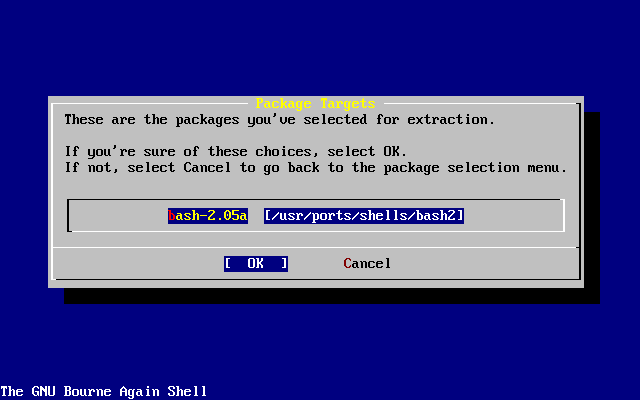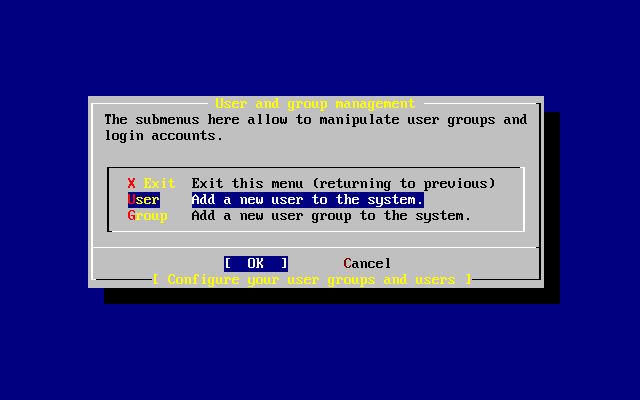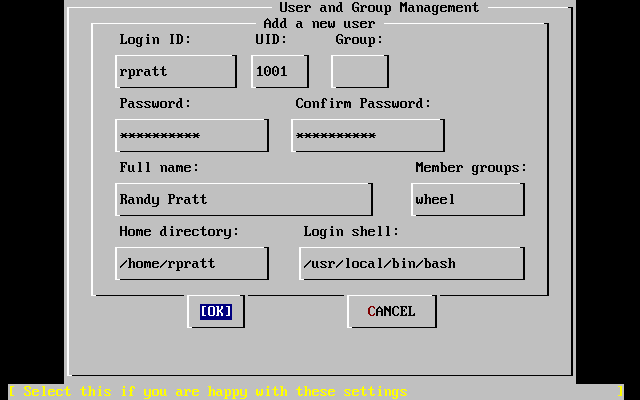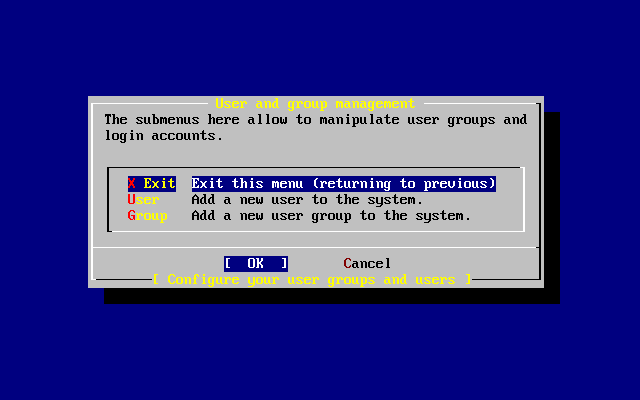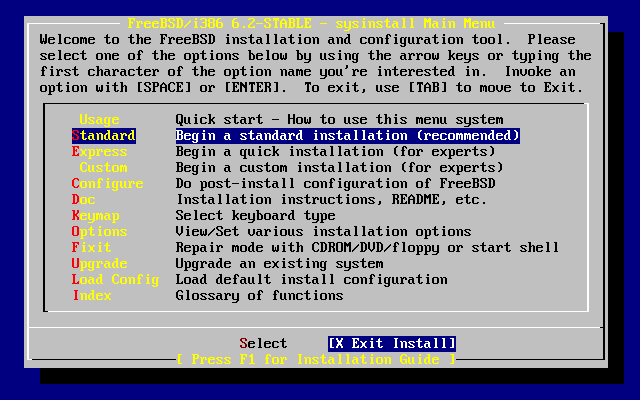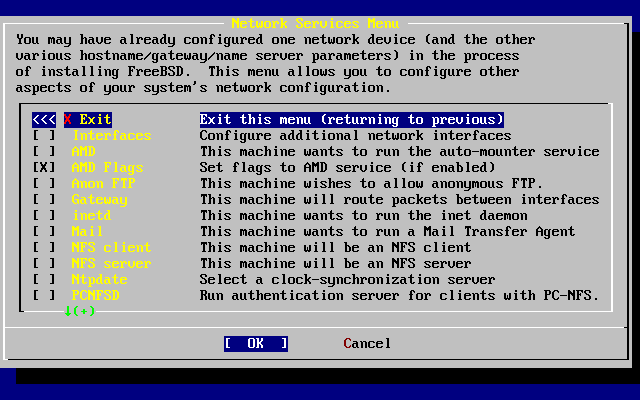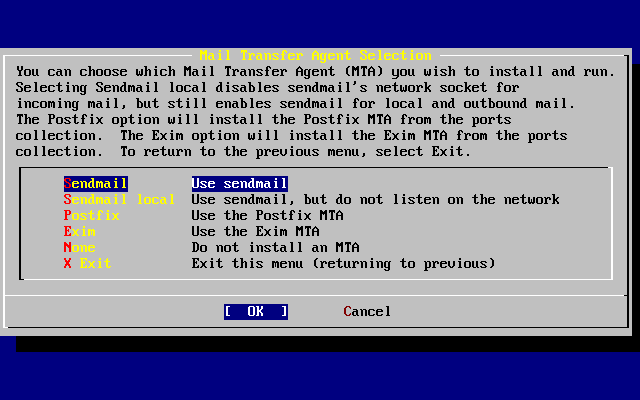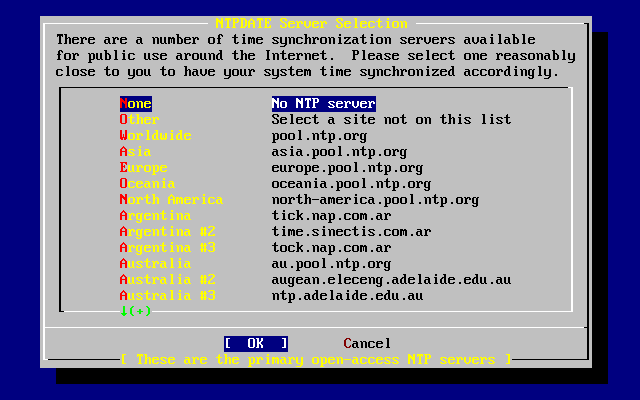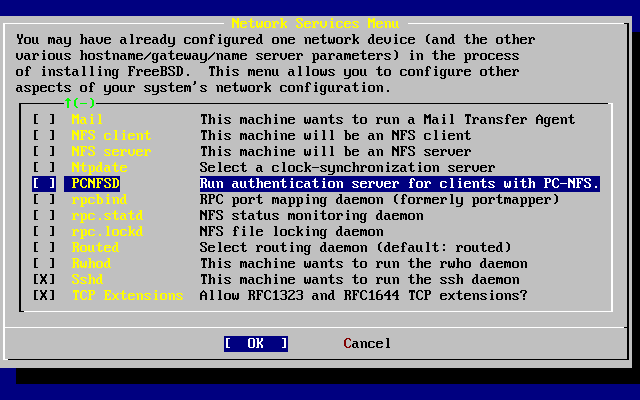2.10. 後續安裝
安裝系統成功之後,可以在新裝好的 FreeBSD 重開機之前,或者是事後再透過 sysinstall (FreeBSD 5.2 之前版本則是 /stand/sysinstall) 然後選擇 選項以進行後續設定。
2.10.1. 設定網路
如果您之前有設定用 PPP 連線透過 FTP 安裝,那麼這個畫面將不會出現; 正如上面剛所說的,您可以稍後再做更改。
有關 LAN 或把 FreeBSD 設定為 gateway 或 router 請參閱使用手冊中有關 網路進階運用 的章節。
User Confirmation Requested
Would you like to configure any Ethernet or SLIP/PPP network devices?
[ Yes ] No
如果要設定網路卡,請選擇 然後按 Enter。 否則請選 以繼續。
用方向鍵選擇您要設定的網路卡,然後按 Enter。
User Confirmation Requested
Do you want to try IPv6 configuration of the interface?
Yes [ No ]
在私人區域網路的情況,由於目前的 Internet 協定 (IPv4)還算夠用, 所以請選 不設定 IPv6,然後按 Enter。
若是透過 RA server 連到既有的 IPv6 環境,那麼就選 並按 Enter,之後系統會花幾秒鐘去搜尋 RA server。
User Confirmation Requested
Do you want to try DHCP configuration of the interface?
Yes [ No ]
接下來,若不需要 DHCP (Dynamic Host Configuration Protocol)請選 並按Enter。
選擇 的話,則會執行 dhclient,若成功要到 IP, 則其會自動填上相關的環境設定,細節請參閱 µÚ 27.5 節。
下面的網路設定圖顯示如何在區域網路(LAN)中, 將該機器設定為 gateway 的方式:
可用 Tab 鍵在各欄位間作切換, 並填上適合的資料:
- Host(機器名稱)
-
完整的機器名稱,例如本例中的 k6-2.example.com。
- Domain(網域)
-
機器所屬的網域名稱,例如本例中的 example.com。
- IPv4 Gateway
-
這裡請輸入 Gateway 的 IP 位址,其可負責將封包轉遞到遠端網路。 只有在該 gateway 屬於該網路其中節點之一時,才要輸入。 若這機器本身要做為該區域網路的 gateway 的話, 請保持本欄為空白。 此外, 通常 IPv4 Gateway 也會被認為是 default gateway 或 default route。
- Name server(Name server 或 DNS server)
-
該網路所用的 DNS server 之 IP。 本例假設該機器所在的網路沒有 DNS,故填上的是該 ISP 所提供的 DNS server (208.163.10.2)。
- IPv4 address
-
The IP address to be used for this interface was 192.168.0.1
- Netmask
-
The address block being used for this local area network is a Class C block (192.168.0.0 - 192.168.0.255). The default netmask is for a Class C network (255.255.255.0).
- Extra options to ifconfig
-
Any interface-specific options to ifconfig you would like to add. There were none in this case.
Use Tab to select when finished and press Enter.
User Confirmation Requested
Would you like to Bring Up the ed0 interface right now?
[ Yes ] No
Choosing and pressing Enter will bring the machine up on the network and be ready for use. However, this does not accomplish much during installation, since the machine still needs to be rebooted.
2.10.2. Configure Gateway
User Confirmation Requested
Do you want this machine to function as a network gateway?
[ Yes ] No
If the machine will be acting as the gateway for a local area network and forwarding packets between other machines then select and press Enter. If the machine is a node on a network then select and press Enter to continue.
2.10.3. Configure Internet Services
User Confirmation Requested
Do you want to configure inetd and the network services that it provides?
Yes [ No ]
If is selected, various services such telnetd will not be enabled. This means that remote users will not be able to telnet into this machine. Local users will still be able to access remote machines with telnet.
These services can be enabled after installation by editing /etc/inetd.conf with your favorite text editor. See µÚ 27.2.1 節 for more information.
Select if you wish to configure these services during install. An additional confirmation will display:
User Confirmation Requested
The Internet Super Server (inetd) allows a number of simple Internet
services to be enabled, including finger, ftp and telnetd. Enabling
these services may increase risk of security problems by increasing
the exposure of your system.
With this in mind, do you wish to enable inetd?
[ Yes ] No
Select to continue.
User Confirmation Requested
inetd(8) relies on its configuration file, /etc/inetd.conf, to determine
which of its Internet services will be available. The default FreeBSD
inetd.conf(5) leaves all services disabled by default, so they must be
specifically enabled in the configuration file before they will
function, even once inetd(8) is enabled. Note that services for
IPv6 must be separately enabled from IPv4 services.
Select [Yes] now to invoke an editor on /etc/inetd.conf, or [No] to
use the current settings.
[ Yes ] No
Selecting will allow adding services by deleting the # at the beginning of a line.
After adding the desired services, pressing Esc will display a menu which will allow exiting and saving the changes.
2.10.4. 啟用 SSH 登入
User Confirmation Requested
Would you like to enable SSH login?
Yes [ No ]
選擇 就會啟用 sshd(8),也就是 OpenSSH 的 daemon 程式。 這會允許該機器可從遠端安全登入。 關於 OpenSSH 請參閱 µÚ 14.11 節 部分的說明。
2.10.5. Anonymous FTP
User Confirmation Requested
Do you want to have anonymous FTP access to this machine?
Yes [ No ]
2.10.5.1. Deny Anonymous FTP
Selecting the default and pressing Enter will still allow users who have accounts with passwords to use FTP to access the machine.
2.10.5.2. Allow Anonymous FTP
Anyone can access your machine if you elect to allow anonymous FTP connections. The security implications should be considered before enabling this option. For more information about security see µÚ 14 章.
To allow anonymous FTP, use the arrow keys to select and press Enter. The following screen (or similar) will display:
Pressing F1 will display the help:
This screen allows you to configure the anonymous FTP user.
The following configuration values are editable:
UID: The user ID you wish to assign to the anonymous FTP user.
All files uploaded will be owned by this ID.
Group: Which group you wish the anonymous FTP user to be in.
Comment: String describing this user in /etc/passwd
FTP Root Directory:
Where files available for anonymous FTP will be kept.
Upload subdirectory:
Where files uploaded by anonymous FTP users will go.
The ftp root directory will be put in /var by default. If you do not have enough room there for the anticipated FTP needs, the /usr directory could be used by setting the FTP Root Directory to /usr/ftp.
When you are satisfied with the values, press Enter to continue.
User Confirmation Requested
Create a welcome message file for anonymous FTP users?
[ Yes ] No
If you select and press Enter, an editor will automatically start allowing you to edit the message.
This is a text editor called ee. Use the instructions to change the message or change the message later using a text editor of your choice. Note the file name/location at the bottom of the editor screen.
Press Esc and a pop-up menu will default to . Press Enter to exit and continue. Press Enter again to save changes if you made any.
2.10.6. Configure Network File System
Network File System (NFS) allows sharing of files across a network. A machine can be configured as a server, a client, or both. Refer to µÚ 27.3 節 for a more information.
2.10.6.1. NFS Server
User Confirmation Requested
Do you want to configure this machine as an NFS server?
Yes [ No ]
If there is no need for a Network File System server, select and press Enter.
If is chosen, a message will pop-up indicating that the exports file must be created.
Message
Operating as an NFS server means that you must first configure an
/etc/exports file to indicate which hosts are allowed certain kinds of
access to your local filesystems.
Press [Enter] now to invoke an editor on /etc/exports
[ OK ]
Press Enter to continue. A text editor will start allowing the exports file to be created and edited.
Use the instructions to add the actual exported filesystems now or later using a text editor of your choice. Note the file name/location at the bottom of the editor screen.
Press Esc and a pop-up menu will default to . Press Enter to exit and continue.
2.10.6.2. NFS Client
The NFS client allows your machine to access NFS servers.
User Confirmation Requested
Do you want to configure this machine as an NFS client?
Yes [ No ]
With the arrow keys, select or as appropriate and press Enter.
2.10.7. System Console Settings
There are several options available to customize the system console.
User Confirmation Requested
Would you like to customize your system console settings?
[ Yes ] No
To view and configure the options, select and press Enter.
A commonly used option is the screen saver. Use the arrow keys to select and then press Enter.
Select the desired screen saver using the arrow keys and then press Enter. The System Console Configuration menu will redisplay.
The default time interval is 300 seconds. To change the time interval, select again. At the Screen Saver Options menu, select using the arrow keys and press Enter. A pop-up menu will appear:
The value can be changed, then select and press Enter to return to the System Console Configuration menu.
Selecting and pressing Enter will continue with the post-installation configurations.
2.10.8. Setting the Time Zone
Setting the time zone for your machine will allow it to automatically correct for any regional time changes and perform other time zone related functions properly.
The example shown is for a machine located in the Eastern time zone of the United States. Your selections will vary according to your geographical location.
User Confirmation Requested
Would you like to set this machine's time zone now?
[ Yes ] No
Select and press Enter to set the time zone.
User Confirmation Requested
Is this machine's CMOS clock set to UTC? If it is set to local time
or you don't know, please choose NO here!
Yes [ No ]
Select or according to how the machine's clock is configured and press Enter.
The appropriate region is selected using the arrow keys and then pressing Enter.
Select the appropriate country using the arrow keys and press Enter.
The appropriate time zone is selected using the arrow keys and pressing Enter.
Confirmation
Does the abbreviation 'EDT' look reasonable?
[ Yes ] No
Confirm the abbreviation for the time zone is correct. If it looks okay, press Enter to continue with the post-installation configuration.
2.10.9. Linux Compatibility
User Confirmation Requested
Would you like to enable Linux binary compatibility?
[ Yes ] No
Selecting and pressing Enter will allow running Linux software on FreeBSD. The install will add the appropriate packages for Linux compatibility.
If installing by FTP, the machine will need to be connected to the Internet. Sometimes a remote ftp site will not have all the distributions like the Linux binary compatibility. This can be installed later if necessary.
2.10.10. Mouse Settings
This option will allow you to cut and paste text in the console and user programs with a 3-button mouse. If using a 2-button mouse, refer to manual page, moused(8), after installation for details on emulating the 3-button style. This example depicts a non-USB mouse configuration (such as a PS/2 or COM port mouse):
User Confirmation Requested
Does this system have a PS/2, serial, or bus mouse?
[ Yes ] No
Select for a PS/2, serial, or bus mouse, or for a USB mouse and press Enter.
Use the arrow keys to select and press Enter.
The mouse used in this example is a PS/2 type, so the default was appropriate. To change protocol, use the arrow keys to select another option. Ensure that is highlighted and press Enter to exit this menu.
Use the arrow keys to select and press Enter.
This system had a PS/2 mouse, so the default was appropriate. To change the port, use the arrow keys and then press Enter.
Last, use the arrow keys to select , and press Enter to enable and test the mouse daemon.
Move the mouse around the screen and verify the cursor shown responds properly. If it does, select and press Enter. If not, the mouse has not been configured correctly —— select and try using different configuration options.
Select with the arrow keys and press Enter to return to continue with the post-installation configuration.
2.10.11. Install Packages
Packages are pre-compiled binaries and are a convenient way to install software.
Installation of one package is shown for purposes of illustration. Additional packages can also be added at this time if desired. After installation sysinstall can be used to add additional packages.
User Confirmation Requested
The FreeBSD package collection is a collection of hundreds of
ready-to-run applications, from text editors to games to WEB servers
and more. Would you like to browse the collection now?
[ Yes ] No
Selecting and pressing Enter will be followed by the Package Selection screens:
Only packages on the current installation media are available for installation at any given time.
All packages available will be displayed if is selected or you can select a particular category. Highlight your selection with the arrow keys and press Enter.
A menu will display showing all the packages available for the selection made:
The bash shell is shown selected. Select as many as desired by highlighting the package and pressing the Space key. A short description of each package will appear in the lower left corner of the screen.
Pressing the Tab key will toggle between the last selected package, , and .
When you have finished marking the packages for installation, press Tab once to toggle to the and press Enter to return to the Package Selection menu.
The left and right arrow keys will also toggle between and . This method can also be used to select and press Enter to return to the Package Selection menu.
Use the Tab and arrow keys to select and press Enter. You will then need to confirm that you want to install the packages:
Selecting and pressing Enter will start the package installation. Installing messages will appear until completed. Make note if there are any error messages.
The final configuration continues after packages are installed. If you end up not selecting any packages, and wish to return to the final configuration, select anyways.
2.10.12. Add Users/Groups
You should add at least one user during the installation so that you can use the system without being logged in as root. The root partition is generally small and running applications as root can quickly fill it. A bigger danger is noted below:
User Confirmation Requested
Would you like to add any initial user accounts to the system? Adding
at least one account for yourself at this stage is suggested since
working as the "root" user is dangerous (it is easy to do things which
adversely affect the entire system).
[ Yes ] No
Select and press Enter to continue with adding a user.
Select with the arrow keys and press Enter.
The following descriptions will appear in the lower part of the screen as the items are selected with Tab to assist with entering the required information:
- Login ID
-
The login name of the new user (mandatory).
- UID
-
The numerical ID for this user (leave blank for automatic choice).
- Group
-
The login group name for this user (leave blank for automatic choice).
- Password
-
The password for this user (enter this field with care!).
- Full name
-
The user's full name (comment).
- Member groups
-
The groups this user belongs to (i.e. gets access rights for).
- Home directory
-
The user's home directory (leave blank for default).
- Login shell
-
The user's login shell (leave blank for default, e.g. /bin/sh).
The login shell was changed from /bin/sh to /usr/local/bin/bash to use the bash shell that was previously installed as a package. Do not try to use a shell that does not exist or you will not be able to login. The most common shell used in the BSD-world is the C shell, which can be indicated as /bin/tcsh.
The user was also added to the wheel group to be able to become a superuser with root privileges.
When you are satisfied, press and the User and Group Management menu will redisplay:
Groups can also be added at this time if specific needs are known. Otherwise, this may be accessed through using sysinstall (/stand/sysinstall in FreeBSD versions older than 5.2) after installation is completed.
When you are finished adding users, select with the arrow keys and press Enter to continue the installation.
2.10.13. Set the root Password
Message
Now you must set the system manager's password.
This is the password you'll use to log in as "root".
[ OK ]
[ Press enter or space ]
Press Enter to set the root password.
The password will need to be typed in twice correctly. Needless to say, make sure you have a way of finding the password if you forget. Notice that the password you type in is not echoed, nor are asterisks displayed.
New password : Retype new password :
The installation will continue after the password is successfully entered.
2.10.14. Exiting Install
If you need to configure additional network devices or any other configuration, you can do it at this point or after installation with sysinstall (/stand/sysinstall in FreeBSD versions older than 5.2).
User Confirmation Requested
Visit the general configuration menu for a chance to set any last
options?
Yes [ No ]
Select with the arrow keys and press Enter to return to the Main Installation Menu.
Select with the arrow keys and press Enter. You will be asked to confirm exiting the installation:
User Confirmation Requested
Are you sure you wish to exit? The system will reboot (be sure to
remove any floppies/CDs/DVDs from the drives).
[ Yes ] No
Select and remove the floppy if booting from the floppy. The CDROM drive is locked until the machine starts to reboot. The CDROM drive is then unlocked and the disk can be removed from drive (quickly).
The system will reboot so watch for any error messages that may appear, see µÚ 2.10.16 節 details.
2.10.15. Configure Additional Network Services
Contributed by Tom Rhodes.Configuring network services can be a daunting task for new users if they lack previous knowledge in this area. Networking, including the Internet, is critical to all modern operating systems including FreeBSD; as a result, it is very useful to have some understanding FreeBSD's extensive networking capabilities. Doing this during the installation will ensure users have some understanding of the various services available to them.
Network services are programs that accept input from anywhere on the network. Every effort is made to make sure these programs will not do anything “harmful”. Unfortunately, programmers are not perfect and through time there have been cases where bugs in network services have been exploited by attackers to do bad things. It is important that you only enable the network services you know that you need. If in doubt it is best if you do not enable a network service until you find out that you do need it. You can always enable it later by re-running sysinstall or by using the features provided by the /etc/rc.conf file.
Selecting the option will display a menu similar to the one below:
The first option, , was previously covered during the µÚ 2.10.1 節, thus this option can safely be ignored.
Selecting the option adds support for the BSD automatic mount utility. This is usually used in conjunction with the NFS protocol (see below) for automatically mounting remote file systems. No special configuration is required here.
Next in line is the option. When selected, a menu will pop up for you to enter specific AMD flags. The menu already contains a set of default options:
-a /.amd_mnt -l syslog /host /etc/amd.map /net /etc/amd.map
The -a option sets the default mount location which
is specified here as /.amd_mnt. The -l option specifies the default log
file; however, when syslogd is used all log activity
will be sent to the system log daemon. The /host directory
is used to mount an exported file system from a remote host, while /net directory is used to mount an exported file system from
an IP address. The /etc/amd.map file defines the default options for AMD exports.
The option permits anonymous FTP connections. Select this option to make this machine an anonymous FTP server. Be aware of the security risks involved with this option. Another menu will be displayed to explain the security risks and configuration in depth.
The configuration menu will set the machine up to be a gateway as explained previously. This can be used to unset the option if you accidentally selected it during the installation process.
The option can be used to configure or completely disable the inetd(8) daemon as discussed above.
The option is used to configure the system's default MTA or Mail Transfer Agent. Selecting this option will bring up the following menu:
Here you are offered a choice as to which MTA to install and set as the default. An MTA is nothing more than a mail server which delivers email to users on the system or the Internet.
Selecting will install the popular sendmail server which is the FreeBSD default. The option will set sendmail to be the default MTA, but disable its ability to receive incoming email from the Internet. The other options here, and act similar to . They both deliver email; however, some users prefer these alternatives to the sendmail MTA.
After selecting an MTA, or choosing not to select an MTA, the network configuration menu will appear with the next option being .
The option will configure the system to communicate with a server via NFS. An NFS server makes file systems available to other machines on the network via the NFS protocol. If this is a stand-alone machine, this option can remain unselected. The system may require more configuration later; see µÚ 27.3 節 for more information about client and server configuration.
Below that option is the option, permitting you to set the system up as an NFS server. This adds the required information to start up the RPC remote procedure call services. RPC is used to coordinate connections between hosts and programs.
Next in line is the option, which deals with time synchronization. When selected, a menu like the one below shows up:
From this menu, select the server which is the closest to your location. Selecting a close one will make the time synchronization more accurate as a server further from your location may have more connection latency.
The next option is the PCNFSD selection. This option will install the net/pcnfsd package from the Ports Collection. This is a useful utility which provides NFS authentication services for systems which are unable to provide their own, such as Microsoft's MS-DOS® operating system.
Now you must scroll down a bit to see the other options:
The rpcbind(8), rpc.statd(8), and rpc.lockd(8) utilities are all used for Remote Procedure Calls (RPC). The rpcbind utility manages communication between NFS servers and clients, and is required for NFS servers to operate correctly. The rpc.statd daemon interacts with the rpc.statd daemon on other hosts to provide status monitoring. The reported status is usually held in the /var/db/statd.status file. The next option listed here is the option, which, when selected, will provide file locking services. This is usually used with rpc.statd to monitor what hosts are requesting locks and how frequently they request them. While these last two options are marvelous for debugging, they are not required for NFS servers and clients to operate correctly.
As you progress down the list the next item here is , which is the routing daemon. The routed(8) utility
manages network routing tables, discovers multicast routers, and supplies a copy of
the routing tables to any physically connected host on the network upon
request. This is mainly used for machines which act as a gateway for the local
network. When selected, a menu will be presented requesting the default location of
the utility. The default location is already defined for you and can be
selected with the Enter key. You will then be presented
with yet another menu, this time asking for the flags you wish to pass on to routed. The default is -q and it
should already appear on the screen.
Next in line is the option which, when selected, will start the rwhod(8) daemon during system initialization. The rwhod utility broadcasts system messages across the network periodically, or collects them when in “consumer” mode. More information can be found in the ruptime(1) and rwho(1) manual pages.
The next to the last option in the list is for the sshd(8) daemon. This is the secure shell server for OpenSSH and it is highly recommended over the standard telnet and FTP servers. The sshd server is used to create a secure connection from one host to another by using encrypted connections.
Finally there is the option. This enables the TCP Extensions defined in RFC 1323 and RFC 1644. While on many hosts this can speed up connections, it can also cause some connections to be dropped. It is not recommended for servers, but may be beneficial for stand alone machines.
Now that you have configured the network services, you can scroll up to the very top item which is and continue on to the next configuration item or simply exit sysinstall in selecting twice then .
2.10.16. FreeBSD 開機流程
2.10.16.1. FreeBSD/i386 的開機流程
If everything went well, you will see messages scroll off the screen and you will arrive at a login prompt. You can view the content of the messages by pressing Scroll-Lock and using PgUp and PgDn. Pressing Scroll-Lock again will return to the prompt.
The entire message may not display (buffer limitation) but it can be viewed from the command line after logging in by typing dmesg at the prompt.
Login using the username/password you set during installation (rpratt, in this example). Avoid logging in as root except when necessary.
Typical boot messages (version information omitted):
Copyright (c) 1992-2002 The FreeBSD Project.
Copyright (c) 1979, 1980, 1983, 1986, 1988, 1989, 1991, 1992, 1993, 1994
The Regents of the University of California. All rights reserved.
Timecounter "i8254" frequency 1193182 Hz
CPU: AMD-K6(tm) 3D processor (300.68-MHz 586-class CPU)
Origin = "AuthenticAMD" Id = 0x580 Stepping = 0
Features=0x8001bf<FPU,VME,DE,PSE,TSC,MSR,MCE,CX8,MMX>
AMD Features=0x80000800<SYSCALL,3DNow!>
real memory = 268435456 (262144K bytes)
config> di sn0
config> di lnc0
config> di le0
config> di ie0
config> di fe0
config> di cs0
config> di bt0
config> di aic0
config> di aha0
config> di adv0
config> q
avail memory = 256311296 (250304K bytes)
Preloaded elf kernel "kernel" at 0xc0491000.
Preloaded userconfig_script "/boot/kernel.conf" at 0xc049109c.
md0: Malloc disk
Using $PIR table, 4 entries at 0xc00fde60
npx0: <math processor> on motherboard
npx0: INT 16 interface
pcib0: <Host to PCI bridge> on motherboard
pci0: <PCI bus> on pcib0
pcib1: <VIA 82C598MVP (Apollo MVP3) PCI-PCI (AGP) bridge> at device 1.0 on pci0
pci1: <PCI bus> on pcib1
pci1: <Matrox MGA G200 AGP graphics accelerator> at 0.0 irq 11
isab0: <VIA 82C586 PCI-ISA bridge> at device 7.0 on pci0
isa0: <ISA bus> on isab0
atapci0: <VIA 82C586 ATA33 controller> port 0xe000-0xe00f at device 7.1 on pci0
ata0: at 0x1f0 irq 14 on atapci0
ata1: at 0x170 irq 15 on atapci0
uhci0: <VIA 83C572 USB controller> port 0xe400-0xe41f irq 10 at device 7.2 on pci0
usb0: <VIA 83C572 USB controller> on uhci0
usb0: USB revision 1.0
uhub0: VIA UHCI root hub, class 9/0, rev 1.00/1.00, addr 1
uhub0: 2 ports with 2 removable, self powered
chip1: <VIA 82C586B ACPI interface> at device 7.3 on pci0
ed0: <NE2000 PCI Ethernet (RealTek 8029)> port 0xe800-0xe81f irq 9 at
device 10.0 on pci0
ed0: address 52:54:05:de:73:1b, type NE2000 (16 bit)
isa0: too many dependant configs (8)
isa0: unexpected small tag 14
fdc0: <NEC 72065B or clone> at port 0x3f0-0x3f5,0x3f7 irq 6 drq 2 on isa0
fdc0: FIFO enabled, 8 bytes threshold
fd0: <1440-KB 3.5" drive> on fdc0 drive 0
atkbdc0: <keyboard controller (i8042)> at port 0x60-0x64 on isa0
atkbd0: <AT Keyboard> flags 0x1 irq 1 on atkbdc0
kbd0 at atkbd0
psm0: <PS/2 Mouse> irq 12 on atkbdc0
psm0: model Generic PS/2 mouse, device ID 0
vga0: <Generic ISA VGA> at port 0x3c0-0x3df iomem 0xa0000-0xbffff on isa0
sc0: <System console> at flags 0x1 on isa0
sc0: VGA <16 virtual consoles, flags=0x300>
sio0 at port 0x3f8-0x3ff irq 4 flags 0x10 on isa0
sio0: type 16550A
sio1 at port 0x2f8-0x2ff irq 3 on isa0
sio1: type 16550A
ppc0: <Parallel port> at port 0x378-0x37f irq 7 on isa0
ppc0: SMC-like chipset (ECP/EPP/PS2/NIBBLE) in COMPATIBLE mode
ppc0: FIFO with 16/16/15 bytes threshold
ppbus0: IEEE1284 device found /NIBBLE
Probing for PnP devices on ppbus0:
plip0: <PLIP network interface> on ppbus0
lpt0: <Printer> on ppbus0
lpt0: Interrupt-driven port
ppi0: <Parallel I/O> on ppbus0
ad0: 8063MB <IBM-DHEA-38451> [16383/16/63] at ata0-master using UDMA33
ad2: 8063MB <IBM-DHEA-38451> [16383/16/63] at ata1-master using UDMA33
acd0: CDROM <DELTA OTC-H101/ST3 F/W by OIPD> at ata0-slave using PIO4
Mounting root from ufs:/dev/ad0s1a
swapon: adding /dev/ad0s1b as swap device
Automatic boot in progress...
/dev/ad0s1a: FILESYSTEM CLEAN; SKIPPING CHECKS
/dev/ad0s1a: clean, 48752 free (552 frags, 6025 blocks, 0.9% fragmentation)
/dev/ad0s1f: FILESYSTEM CLEAN; SKIPPING CHECKS
/dev/ad0s1f: clean, 128997 free (21 frags, 16122 blocks, 0.0% fragmentation)
/dev/ad0s1g: FILESYSTEM CLEAN; SKIPPING CHECKS
/dev/ad0s1g: clean, 3036299 free (43175 frags, 374073 blocks, 1.3% fragmentation)
/dev/ad0s1e: filesystem CLEAN; SKIPPING CHECKS
/dev/ad0s1e: clean, 128193 free (17 frags, 16022 blocks, 0.0% fragmentation)
Doing initial network setup: hostname.
ed0: flags=8843<UP,BROADCAST,RUNNING,SIMPLEX,MULTICAST> mtu 1500
inet 192.168.0.1 netmask 0xffffff00 broadcast 192.168.0.255
inet6 fe80::5054::5ff::fede:731b%ed0 prefixlen 64 tentative scopeid 0x1
ether 52:54:05:de:73:1b
lo0: flags=8049<UP,LOOPBACK,RUNNING,MULTICAST> mtu 16384
inet6 fe80::1%lo0 prefixlen 64 scopeid 0x8
inet6 ::1 prefixlen 128
inet 127.0.0.1 netmask 0xff000000
Additional routing options: IP gateway=YES TCP keepalive=YES
routing daemons:.
additional daemons: syslogd.
Doing additional network setup:.
Starting final network daemons: creating ssh RSA host key
Generating public/private rsa1 key pair.
Your identification has been saved in /etc/ssh/ssh_host_key.
Your public key has been saved in /etc/ssh/ssh_host_key.pub.
The key fingerprint is:
cd:76:89:16:69:0e:d0:6e:f8:66:d0:07:26:3c:7e:2d root@k6-2.example.com
creating ssh DSA host key
Generating public/private dsa key pair.
Your identification has been saved in /etc/ssh/ssh_host_dsa_key.
Your public key has been saved in /etc/ssh/ssh_host_dsa_key.pub.
The key fingerprint is:
f9:a1:a9:47:c4:ad:f9:8d:52:b8:b8:ff:8c:ad:2d:e6 root@k6-2.example.com.
setting ELF ldconfig path: /usr/lib /usr/lib/compat /usr/X11R6/lib
/usr/local/lib
a.out ldconfig path: /usr/lib/aout /usr/lib/compat/aout /usr/X11R6/lib/aout
starting standard daemons: inetd cron sshd usbd sendmail.
Initial rc.i386 initialization:.
rc.i386 configuring syscons: blank_time screensaver moused.
Additional ABI support: linux.
Local package initialization:.
Additional TCP options:.
FreeBSD/i386 (k6-2.example.com) (ttyv0)
login: rpratt
Password:
Generating the RSA and DSA keys may take some time on slower machines. This happens only on the initial boot-up of a new installation. Subsequent boots will be faster.
If the X server has been configured and a Default Desktop chosen, it can be started by typing startx at the command line.
2.10.16.2. FreeBSD/alpha 開機流程
Once the install procedure has finished, you will be able to start FreeBSD by typing something like this to the SRM prompt:
>>>BOOT DKC0
This instructs the firmware to boot the specified disk. To make FreeBSD boot automatically in the future, use these commands:
>>> SET BOOT_OSFLAGS A >>> SET BOOT_FILE '' >>> SET BOOTDEF_DEV DKC0 >>> SET AUTO_ACTION BOOT
The boot messages will be similar (but not identical) to those produced by FreeBSD booting on the i386™.
2.10.17. FreeBSD Shutdown
It is important to properly shutdown the operating system. Do not just turn off power. First, become a superuser by typing su at the command line and entering the root password. This will work only if the user is a member of the wheel group. Otherwise, login as root and use shutdown -h now.
The operating system has halted. Please press any key to reboot.
It is safe to turn off the power after the shutdown command has been issued and the message “Please press any key to reboot” appears. If any key is pressed instead of turning off the power switch, the system will reboot.
You could also use the Ctrl+Alt+Del key combination to reboot the system, however this is not recommended during normal operation.
